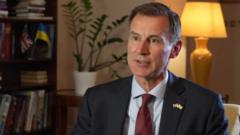4 hours ago
About sharing
Jeremy Hunt has defended plans to slash civil service jobs to increase defence spending and Ukraine aid, during a surprise trip to Kyiv.
The chancellor said cutting public services will cost “a great deal less” compared to allowing Russia to succeed.
The government has pledged to increase UK military spending to 2.5% of national income by 2030.
Mr Hunt confirmed the increase will cost an extra £20bn, which unions claim will be funded by cutting 70,000 jobs.
Downing Street said the plans would be funded through existing commitments to reduce the civil service headcount to pre-Covid levels, and giving the ministry of defence (MoD) a share of an already-announced increase in government research spending.
The Public and Commercial Services Union said cutting civil servants’ jobs to pay for higher defence spending would lead to longer waiting lists for new passports, driving tests and driving licence.
The announcement comes after Prime Minister Rishi Sunak confirmed the UK would provide an additional £500m for Ukraine this year, on top of £2.5bn already allocated.
Mr Sunak added that the UK could continue to provide “at least the current level of military support to Ukraine for every year it is needed”.
Speaking in Kyiv ahead of a meeting with President Volodymyr Zelensky, Mr Hunt said he hope the increased funding would be “a turning point in this war”.
“We think other European countries will follow us and that will send a message to Putin that he is not going to succeed,” Mr Hunt said.
The “UK has a special role” in supporting the Ukraine war effort, because “we have the largest defence budget in Europe,” he added.
“I’m here because if we want to restore peace in Europe, we must make sure that Putin does not succeed with his evil war of aggression right here in Ukraine,” he said.
On shrinking the civil service to pay for defence spending and Ukraine aid, he said: “This is a choice but the choice we are making is to invest in European security and defence.
“And if we stop Putin doing what he is trying to do in Ukraine, in the end, it will cost all of us a great deal less.
“I think it is reasonable to reduce the civil service to the size it was pre-Covid, and I’m confident we can do that with more efficient delivery of public services.”
Mr Hunt confirmed the spending, which will gradually increase over the next six years, would be £20bn more than if spending stayed at its current level of 2.3% of GDP.
The additional funding will also help resource MoD programmes already under way – such as an order for new naval frigates, the development of a new fighter jet, and the modernisation of Britain’s nuclear weapons systems.
These programmes are proving to be very expensive and the MoD has been struggling to make ends meet on its existing resources.
Labour’s shadow defence secretary John Healey said on Tuesday his party “wants to see a fully funded plan” to reach this level.
But the Tories had “shown time and time again that they cannot be trusted on defence”, he added.
He said Labour would review resources for the armed forces within a year of taking office, if it wins the general election later this year.
1 day ago
8 March
1 day ago
15 February
